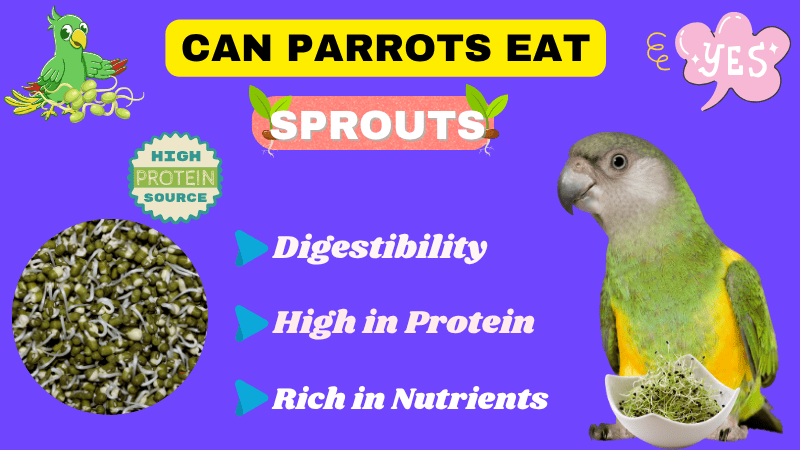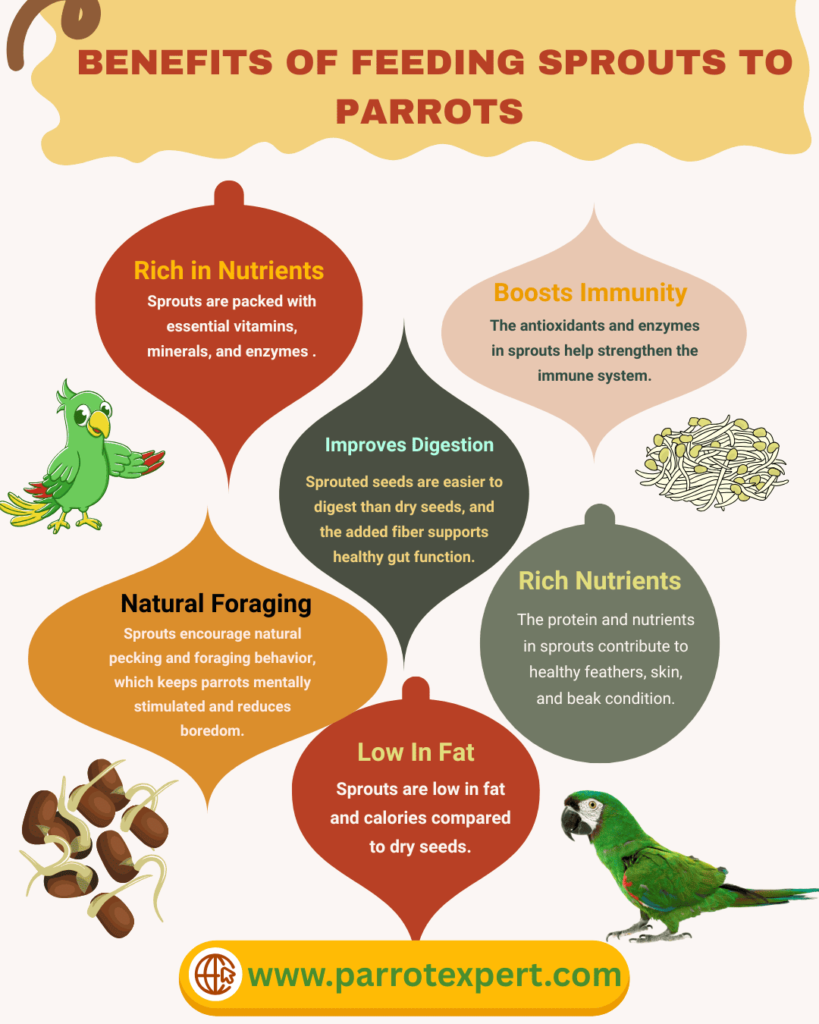As you known, sprouts are the delicious and the nutrition food for humans. But, here our main question is about ‘Can Parrots Eat Sprouts Seeds or Not?’ Yes, buddies can eat because they are safe and nutritious treat.
As a responsible pet owner, it is essential to offer the healthy and the nutritious diet to parrots. The seeds and the pellets are the main source of their meal. You can also add variety of different fresh fruits, vegetables and other necessary nutrients to their meal.

The best option to serve is the sprouts that are small young plants that are in the initial stage to grow. So, you can consider them as great source of vitamins, minerals and the other enzymes that are good for parrots healthy well being.
It is crucial to serve the sprouts only in moderation and make sure that they are free from any dangerous contaminants. This article will delve into the world of whether parrots can eat sprouts or not, the health benefits, and how to introduce it for the first time.
What Are About Sprouts?
These are the seeds that have started to germinate and grow into minor plants. This process enables the enzymes to boost the nutritional content of the seed’s which make sprouts easy to eat and digest.
Also Read: Can Parrots Eat Cranberries (Seeds + Juice + Raw)? Fact & Myths
Here are some common types of sprouts:
- Alfalfa
- Mung beans
- Chickpeas
- Lentils
- Sunflower seeds
- Wheat berries
- Broccoli
- Radish
- Quinoa
Sprouts can be preparing at home by purchasing the pre sprouted. But, here you have to need the attentive selection to make sure the freshness and the safety.
Healthy Benefits of Sprouts for Parrots
Here are some potential health benefits of sprouts for your buddy. Do You Know? Sprouts are a best one medium of getting necessary vitamins and minerals. It also provides vitamin C, Vitamin K and minerals.
Some sprouts such as broccoli and alfalfa are high in Vitamins C. This is vital for parrots as it helps in production of collagen.
It is required to maintain the healthy connective tissues, beaks and the feathers of birds. Shedding of feathers can be stopping by serving the sprouts in their diet.
As told above, essential vitamins such as Vitamin A, C and K are present in sprouts. While Vitamin C helps to cure scurvy in parrots and relieve them from the joint pain and other normal weakness.
Also Read: Can Parrots Eat Carrots? (Yes or Not} Feeding Guide
Whereas, Vitamin K is necessary for blood clotting and improves bone health. Mainly Alfalfa sprouts, includes the particularly great amount of Vitamin K. It is good and is beneficial for parrot’s overall healthy well being.
At last, the minerals are found in lentil and the mung bean sprouts that are important for the healthy bone and the formation of eggshells in breeding females.
Calcium, Magnesium and the Iron in these sprouts produces the blood and also facilitates the transportation of oxygen to make parrot happy and healthy.
Serving sprouts to parrots has been the best decision. It does not reflect any risks to your feathered friend overall health.
Negative Impact of Feeding Sprout to Parrots
Parrots need a diverse and the well balanced healthy diet to survive. Many bird owners continuously look for the best nutritious meal for their buddy.
Sprouts is the food that is advising most of the time as they are the great source of essential vitamins, nutrients and offers a different variety of flavors and textures.
Moreover, it is necessary for parrot lovers to be aware about the potential health concerns while feeding sprouts to birds.
Bacterial Contamination is the potential risk that caused by eating sprouts. Fresh produced sprouts contain the harmful bacteria like Salmonella and E.coli. This is due to the warm and extremely moist temperature in which sprouts are grown is the most important for the bacterial growth.
Also Read: Can Parrots Eat Watermelon (Seed + Rind)? Feeding Guide
Proper cleaning of seeds can lower the risks of bacterial contaminants. As parrots have delicate digestive system so it is crucial to feed them carefully.
Lower the risks of bacterial contaminants, it is advised to buy the seeds from the reputable sources that particularly states that they are intended for sprouting. These seeds get mostly testing by the bacteria and less likely to contaminate. Washing and rinsing sprouts thoroughly can avoid intake of bacterial contaminants by parrots.
Another risk included while serving the sprouts to buddies is choking. Especially smaller pieces of parrots can have difficulty in digesting the large pieces of foods including sprouts.
It is necessary to serve the sprouts into smaller pieces, more manageable pieces to prevent choking. Some birds may have problems with the texture of sprouts, mainly if they are not in a habit to eat them. Introduce sprouts slowly and gradually and examines the signs of discomfort.
How Do You Sprout Seeds for Parrots?
To sprout the seeds, go with natural, untreated seeds such as mung beans, lentils and sunflower seeds. Rinse the seeds thoroughly to remove the dust and the bacteria. Soak seeds for about 8-12 hours in clean and filtered water before feeding.
Also Read: Can Parrots Eat Tomatoes? Complete Feeding Guide
Drain and rinse the seeds thoroughly after soaking and place them in the jar or any mesh covered container. The jar should be kept in the cool or shaded area.
Always ensure to rinse and drain the seeds twice daily to avoid mold and bacteria. The sprouts are ready within 2 to 5 days.
The sprouts can be stored in the refrigerator and can be used for few days. Inspect the mold before feeding.
Which Seeds Can Be Sprouted Easily?
Always check carefully which seeds are safe for parrot to eat. Split peas and the lentils can’t be sprouted because of the legumes remains for as short period of time. Some beans such as kidney beans must be cooked properly before feeding as they might be harmful for parrots.
Sprouting process is not so complex. You need to soak the seeds, grains and legumes for about 8 to 12 hours. After soaking, drain and rinse the seeds twice a day until the white tail appears.
While soaking these items, it is good to add a tablespoon of raw, unpasteurized apple cider vinegar or few drops of grapefruit seeds to avoid the bacteria and the mould growth.
How Can You Introduce Sprouts to Parrot?
The new food should be introduces slowly and gradually. Here are some steps:
Take small amount of sprouts and mix with their daily primary diet or serve as an occasional treat.
Also Read: Can Parrots Eat Strawberries {Seed & Leaves}? Should Be Known
Notice the reactions after feeding if they show any signs of allergic or digestive upset.
Few parrots need some time to be familiar with the new foods. Proving sprouts in their daily diet can make them habitual.
FAQs (Frequently Asked Questions)
Can Parrots Eat Alfalfa Sprouts?
Of Course! Parrots can eat alfalfa sprouts as they are considered as the safe and offers the adequate amount of vitamins and minerals. Serve fresh, well rinsed sprouts in the moderation as a part of their balanced diet.
Can Parrots Eat Brussel Sprouts?
Brussels sprouts are safe for parrots to consume as they are high in vitamins and antioxidants. Always ensure to wash them carefully, rinse and feed in either a raw form or lightly cooked but in moderation.
Can Parrots Eat Bean Sprouts?
Absolutely! Bean sprouts are safe for parrots to eat. They are healthy, safe and nutritious meal if fed fresh. Do not feed the raw kidney beans sprouts as they are dangerous.
Can Parrots Eat Mung Bean Sprouts?
Mung beans are nutritious, high in protein and vitamins. They can be fed to parrots but in moderation. Always ensure to serve the clean and fresh so as to void any harmful effects.
Final Thoughts: Can Parrots Eat Sprouts Seeds?
As resulting of this article, sprouts also come in the list of healthy food for parrot’s balanced diet, if it is fed in the moderation. This is because; they offer the essential nutrients, vitamins, minerals and enzymes that improve the overall health, and aids in digestion.
Also Read: Can Parrots Eat Lemons (Peel + Seeds + Juice)? Should be Known
Sprouts for parrots are safe and can be fed as a source of their balanced diet. They will enjoy every bite if served with proper care and preparation.
Do you have any experience, tips, tricks, or query regarding on this? You can drop a comment!
Have a Nice Day!!




